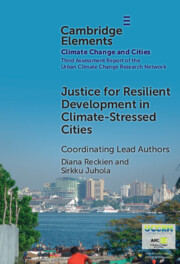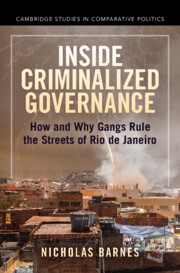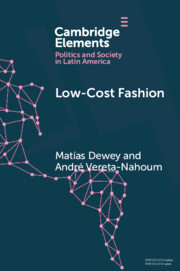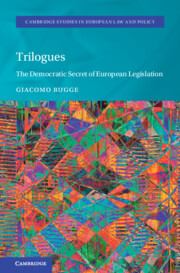Refine search
Actions for selected content:
57 results

Justice for Resilient Development in Climate-Stressed Cities
-
- Published online:
- 12 June 2025
- Print publication:
- 10 July 2025
-
- Element
-
- You have access
- Open access
- HTML
- Export citation
Informality in Governance: Evaluating Intergovernmental Relations in Kenya’s Health Sector During the COVID-19 Pandemic
-
- Journal:
- Journal of African Law / Volume 69 / Issue 2 / June 2025
- Published online by Cambridge University Press:
- 21 March 2025, pp. 289-306
- Print publication:
- June 2025
-
- Article
-
- You have access
- Open access
- HTML
- Export citation
4 - The Origins of Criminalized Governance
-
- Book:
- Inside Criminalized Governance
- Published online:
- 06 February 2025
- Print publication:
- 13 February 2025, pp 97-135
-
- Chapter
- Export citation
6 - Comando Vermelho of Parque União
-
- Book:
- Inside Criminalized Governance
- Published online:
- 06 February 2025
- Print publication:
- 13 February 2025, pp 173-204
-
- Chapter
- Export citation
7 - Terceiro Comando (Puro) of Complexo da Maré
-
- Book:
- Inside Criminalized Governance
- Published online:
- 06 February 2025
- Print publication:
- 13 February 2025, pp 205-242
-
- Chapter
- Export citation

Inside Criminalized Governance
- How and Why Gangs Rule the Streets of Rio de Janeiro
-
- Published online:
- 06 February 2025
- Print publication:
- 13 February 2025

Low-Cost Fashion
- The Political Economy of Garment Production and Distribution in Latin America
-
- Published online:
- 06 February 2025
- Print publication:
- 13 February 2025
-
- Element
- Export citation
4 - Trilogues
-
- Book:
- Trilogues
- Published online:
- 09 January 2025
- Print publication:
- 23 January 2025, pp 103-139
-
- Chapter
- Export citation

Trilogues
- The Democratic Secret of European Legislation
-
- Published online:
- 09 January 2025
- Print publication:
- 23 January 2025
2 - Economic Drivers of Welfare Nationalism
- from Part II - Economic Drivers and Political Mobilizers of Welfare Nationalism and Exclusion in Russia and Europe
-
- Book:
- Welfare Nationalism in Europe and Russia
- Published online:
- 14 November 2024
- Print publication:
- 21 November 2024, pp 33-58
-
- Chapter
- Export citation
The impact of skill mismatch on unemployment, informality, and labour turnover
-
- Journal:
- The Economic and Labour Relations Review / Volume 35 / Issue 4 / December 2024
- Published online by Cambridge University Press:
- 13 November 2024, pp. 980-999
-
- Article
- Export citation
The Distributive Impact of the Labour Market and of Cash Transfer Policies during the COVID-19 Pandemic in Latin America
-
- Journal:
- Journal of Latin American Studies / Volume 56 / Issue 4 / November 2024
- Published online by Cambridge University Press:
- 28 April 2025, pp. 683-714
- Print publication:
- November 2024
-
- Article
- Export citation
Community and informal institutions in reforms under crises: the odyssey of a 350-year-old functionally credible water commons
-
- Journal:
- Journal of Institutional Economics / Volume 20 / 2024
- Published online by Cambridge University Press:
- 17 October 2024, e33
-
- Article
-
- You have access
- Open access
- HTML
- Export citation
7 - International Consequences of Domestic Politics
- from Part III - Informality within Institutions
-
-
- Book:
- Informal Governance in World Politics
- Published online:
- 23 May 2024
- Print publication:
- 30 May 2024, pp 161-187
-
- Chapter
- Export citation
2 - From Complex Interdependence to Complex Governance
- from Part II - Informality of Institutions
-
-
- Book:
- Informal Governance in World Politics
- Published online:
- 23 May 2024
- Print publication:
- 30 May 2024, pp 31-52
-
- Chapter
- Export citation
4 - Informal Governance in the Development Regime
- from Part II - Informality of Institutions
-
-
- Book:
- Informal Governance in World Politics
- Published online:
- 23 May 2024
- Print publication:
- 30 May 2024, pp 74-106
-
- Chapter
- Export citation
5 - Informal Governance of International Climate Policy
- from Part II - Informality of Institutions
-
-
- Book:
- Informal Governance in World Politics
- Published online:
- 23 May 2024
- Print publication:
- 30 May 2024, pp 107-129
-
- Chapter
- Export citation
1 - Informality in Global Governance
- from Part I - Introduction
-
-
- Book:
- Informal Governance in World Politics
- Published online:
- 23 May 2024
- Print publication:
- 30 May 2024, pp 3-28
-
- Chapter
- Export citation
3 - Soft Pooling
- from Part II - Informality of Institutions
-
-
- Book:
- Informal Governance in World Politics
- Published online:
- 23 May 2024
- Print publication:
- 30 May 2024, pp 53-73
-
- Chapter
- Export citation
8 - Knowledge Guardians in Informal Networks
- from Part III - Informality within Institutions
-
-
- Book:
- Informal Governance in World Politics
- Published online:
- 23 May 2024
- Print publication:
- 30 May 2024, pp 188-212
-
- Chapter
- Export citation
